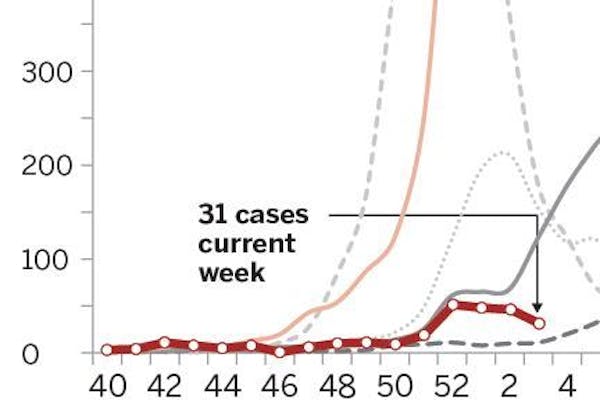Signs of an uptick in the flu season are emerging across Minnesota, with Twin Cities hospitals announcing precautions to contain the virus and a rural school district canceling classes because 20 percent of its students are sick.
State health officials said the events underscore the need to be vigilant and take good public health precautions, even though the number of outbreaks in schools and nursing homes and the rate of patients hospitalized so far this winter has been relatively low.
"Still time to get vaccinated," said Karen Martin, a state health epidemiologist. "Still a good idea."
The state has tallied 26 influenza-like outbreaks in schools in the past two weeks, and reports from the Wabasso Public Schools suggest that more may be coming.
All classes, activities and practices in the southwest Minnesota district were canceled for Thursday and Friday after 74 students and nine staff members called in sick on Wednesday. That was up from 53 students who were out ill on Tuesday.
Superintendent Wade McKittrick said in a Facebook posting that the closure was necessary "to combat the large amount of illness and prevent further spread." Classes in the district serving Lucan, Seaforth, Vesta, Wanda and Wabasso are set to resume Monday.
This winter's flu season appears milder than the 2017-2018 season, which resulted in 435 flu-related deaths and 6,446 hospitalizations. So far this season, the state has reported 10 flu-related deaths. None involved children. Figures released Thursday by the Minnesota Department of Health showed that flu-related hospitalizations declined slightly, from 46 two weeks ago to 31 last week.
Martin said the H1A flu strain circulating this year is often associated with milder seasons than the H3 strain that dominated last year's outbreaks. Some flu seasons can have aggressive second acts, though, when B strains emerge in the late winter and early spring.
The U.S. Centers for Disease Control and Prevention reported last week that this season's influenza vaccine appears well-matched to the circulating strains of virus. Vaccine effectiveness has ranged from 10 percent to 60 percent over the past decade.
Estimates of how many Minnesotans received the vaccine will come out in the spring, Martin said.
Earlier this week, Allina Health began restricting visitors at its hospitals and clinics "to protect all patients, visitors and staff from influenza." Allina operates more than 65 medical clinics as well as 12 Minnesota hospitals, including Abbott Northwestern in Minneapolis, United in St. Paul and Mercy in Coon Rapids and Fridley.
Allina asks anyone who is sick, and children under age 5, to refrain from visiting patients in its hospitals and clinics. Anybody with a sore throat will be asked to wear a mask, and visitors to birth centers and baby units will be screened for wellness, the hospital said.
Other hospitals have taken similar measures. Children's Hospitals and Clinics of Minnesota enacted its standard winter precautions on Nov. 13; they include daily wellness checks of visitors, who then wear green, yellow or red badges that determine their level of hospital access and whether they must wear masks. The University of Minnesota announced its own set of visitor precautions at its hospitals on Jan. 21.
Jeremy Olson • 612-673-7744






